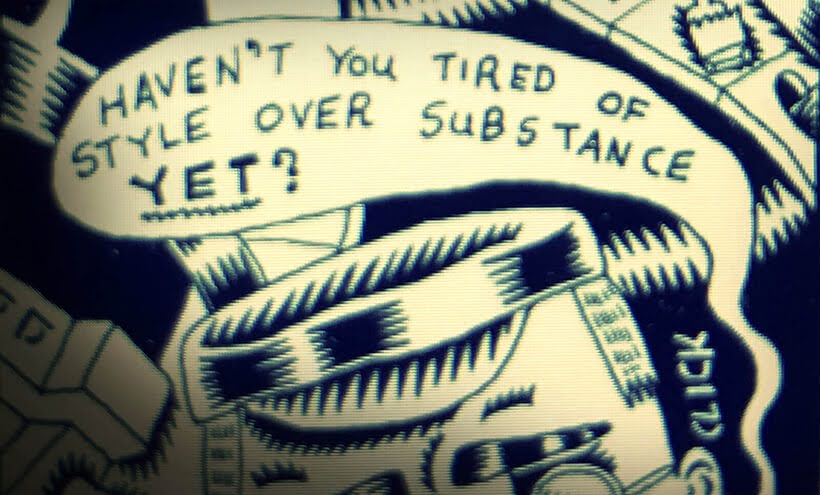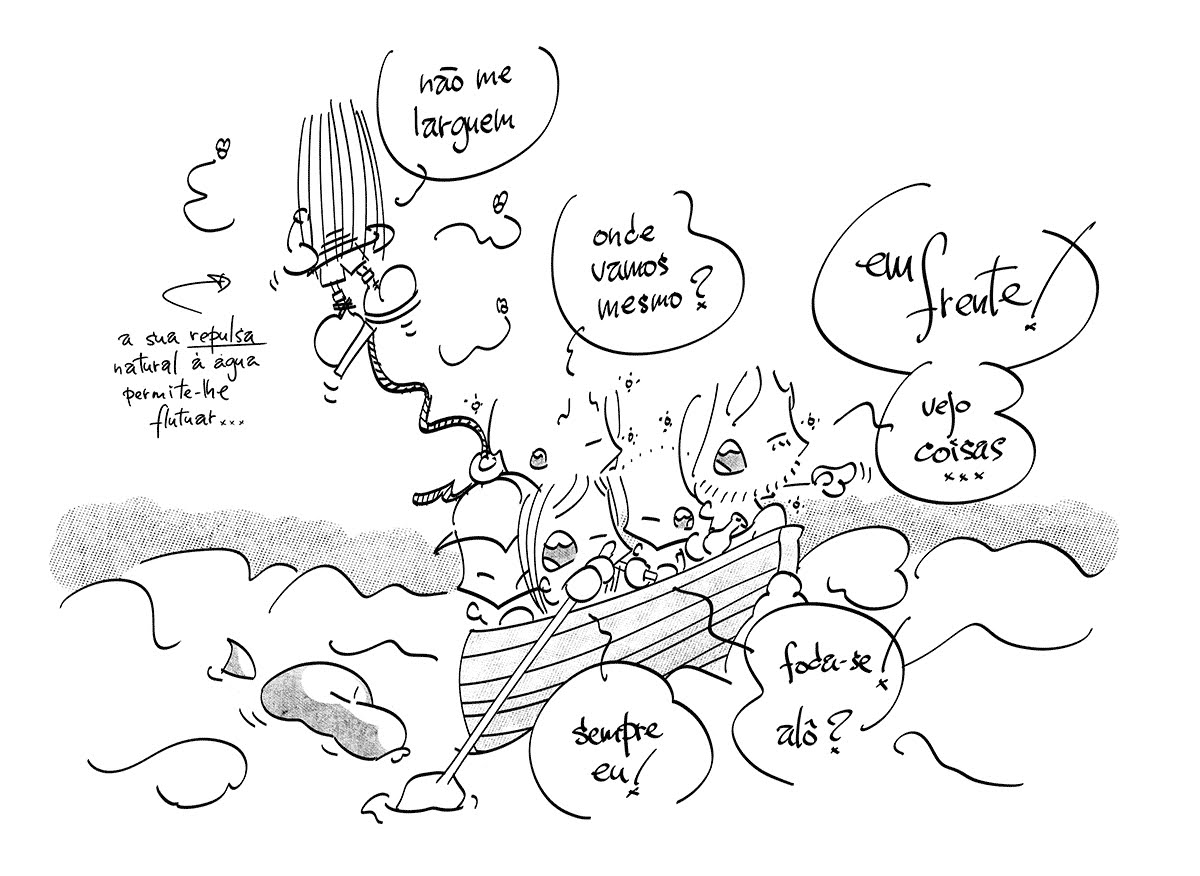motley cru
« We Seem To Just Be Steamrolling Toward Tragedy comedy! »
 tired substance
tired substanceDas florestas inóspitas do Canadá ártico de Jeff Lemire para o Ohio rural de Derf Backderf, unidos num mesmo "small-town America as the site of bitter political rivalries, pettiness, consumerism, surveillance, and a lack of accountability". Uma viagem com propósitos mais pedagógicos que turísticos, continuação do nosso périplo a reclamar preços de capa e formatos de livros, incapacidade de impingir banda desenhada a crescidos incrédulos dessa, o zeitgeist e coincidências: em toda a linha do horizonte uma paisagem desolada. Senhores, outra-vez-ainda! a nossa contraproposta a convencer-vos para arriscarem num modelo de produção herdado dos 60's underground e variado nos 90 alts — se não podemos atravessar o mesmo rio duas vezes, podemos pelo menos usar as pontes que ficam?
O nosso entusiasmo (*) Naysayers devem saber que estivemos com o decay dos alt-weekly noutras ocasiões. Fuck off. por banda desenhada acessível (ie: barata-ao-grátis) em suporte descartável explica-se pelas razões óbvias que tentem todos aqueles intentados a consequências por causas: formato certo e preço igual sobre um modelo de distribuição às massas com conteúdos tendencialmente na ordem do dia. As MNRGs deste mundo tentam — e falham? — agregar certos públicos talvez pressupondo a existência desses por graça divina. Somos muito menos crédulos e arrancamos da suposição que o trajecto deve ser inverso: os teens não podem ser repreendidos porque não conseguem encontrar a BD que merecem, esta deve ir ao seu encontro. É da condição de ser-se puto: um dia crescem.
Fechamos época do último dia de agosto no TCJ que num único excerto condensa / combina todo o nosso programa. Segue-se mashup:
The [comic strip] was always right here, right now, in the moment. That immediacy was unique to newspaper cartoons and something I really enjoyed. I felt like I was part of the zeitgeist. (*) "And that’s also why some of those strips are unreadable now."
O-que-ele-disse. But a comic strip was also disposable. It was a free weekly, and when the reader was done with it, they tossed it away or left it on the train seat. We printed 100,000 copies a week, but no one saved them. There were people who picked up the paper just for my strip, but there were also lots of readers who weren’t particularly comics fans, who would glance at the strip while flipping through the paper. Otherwise, they didn’t read comics. You have to buy a book. You’re not going to just stumble over a pile of them stacked up in the doorway of a coffee shop. It’s a different relationship between cartoonist and book reader. The potential readership was a lot greater in newspapers. So maybe I generated some interest in comics where there wasn’t any before.
in "'We Seem To Just Be Steamrolling Toward Tragedy.': An Interview With Derf Backderf" 31 ago 2020
Antes das peneiras das novelas, autores que agora iluminam o firmamento de todas-as-coisas-sérias da BD não eram estranhos à tira do mastiga e deita fora:
The weekly strips of the Nineties were so amazing, and distinctive, with Lynda Barry, Chris Ware, Alison Bechdel, Ben Katchor and all the rest. I think the weekly strips were the best comics being made at the time, bar none. It’s a genre that hasn’t been given its historical due.
in "'We Seem To Just Be Steamrolling Toward Tragedy.': An Interview With Derf Backderf" 31 ago 2020
Lá em cima com os demais contamos o próprio Derf, dos poucos "writing about the Rust Belt and about small towns in the Midwest" (*) O "Skyscrapers of the Midwest" de Joshua Cotter, por razões diferentes, também bate escalas a meio do oeste. naquele registo que mais nos toca. Mudamos de citação para mini-bio com água ao nosso moinho:
The connection between journalism and comics runs very deep. You could say the first cut is the deepest of all. Comics and journalism in America goes back to its very roots. This brings us to Derf Backderf who is an excellent example of the cartoonist auteur compelled to explain and report.
in "Review: ‘Kent State: Four Dead in Ohio’ by Derf Backderf" 31 ago 2020
Ao caso, o "Kent State: Four Dead in Ohio" 2020, e de cuja entrevista retiramos algumas certezas habituais por este espaço...
in "'We Seem To Just Be Steamrolling Toward Tragedy.': An Interview With Derf Backderf" 31 ago 2020
- i) Press: You quickly learn what sources to trust and not trust, it just comes from carefully reading the material. If you see too many errors or slanted coverage, you just say screw them, and focus on the ones that got it right.
- ii) Tech: Technology is really working in the favor of activists today. We see it all unfold on video, and it exploded all over the world. They didn’t have that technology in 1970.
...e iii) da resistência que os comics como meio enfrentam entre gentios:
The genre of comics itself is still a bit unusual for recounting a story like this, at least to the public at large, not to us enlightened comics folk. One of the photographers who took some of the May 4 photos said there was no way comics could legitimately add anything to the historical account of the Shootings. It’s the stubborn backward attitude about comics as an artform.
in "'We Seem To Just Be Steamrolling Toward Tragedy.': An Interview With Derf Backderf" 31 ago 2020
Voltemos ao artform e atitudes às costas. O conteúdo é condicionado pelo formato e indissociável desse seu suporte, porém são duas camadas à agência de gentes diferentes: os formatos são maioritariamente obra dos mercados —"it’s a steadfast rule in the book biz" (*)Arranham-no na entrevista a propósito da orientação do artwork redesenhado à capa e spread pag.218-219. —, os (melhores) conteúdos iniciativa do artista. Todos aqueles ideologicamente mais informados mas embirrados ao artsy fariam bem em recordar-se que o estilo pode ser um estalo:
[TCJ] - Comics scholars often discuss drawing style as the most immediate aspect of a graphic narrative and as the reader’s entry point into the graphic storyworld. How do you feel your style works as an entranceway or an extension of the storyworld?
[Derf] - That’s a tough one to answer. I don’t really think about that. I draw like I draw.
in "'We Seem To Just Be Steamrolling Toward Tragedy.': An Interview With Derf Backderf" 31 ago 2020
Don't-you-all. Não estamos a atirar pedras. Mas importa admiti-lo.

